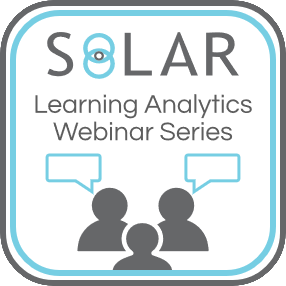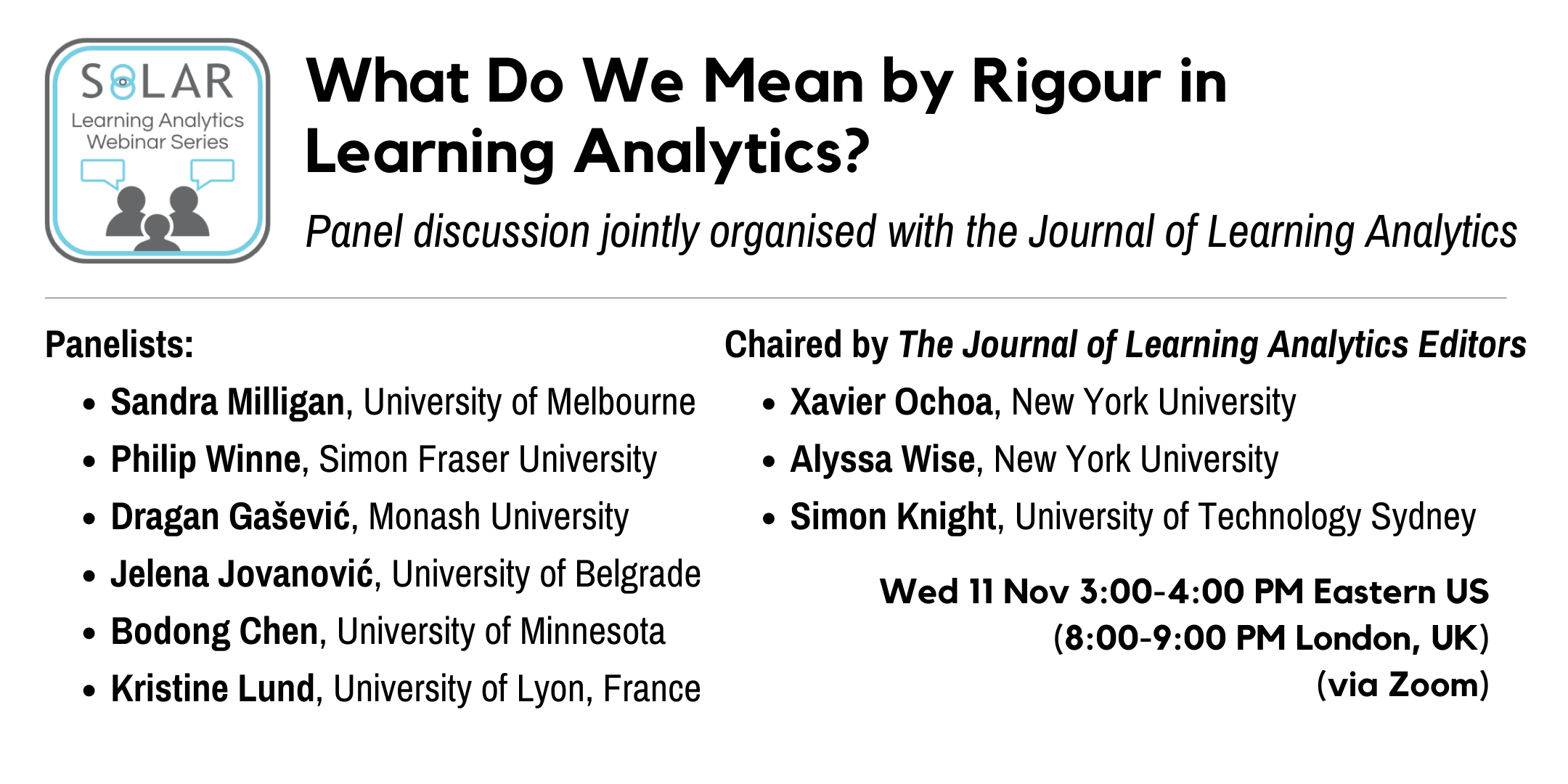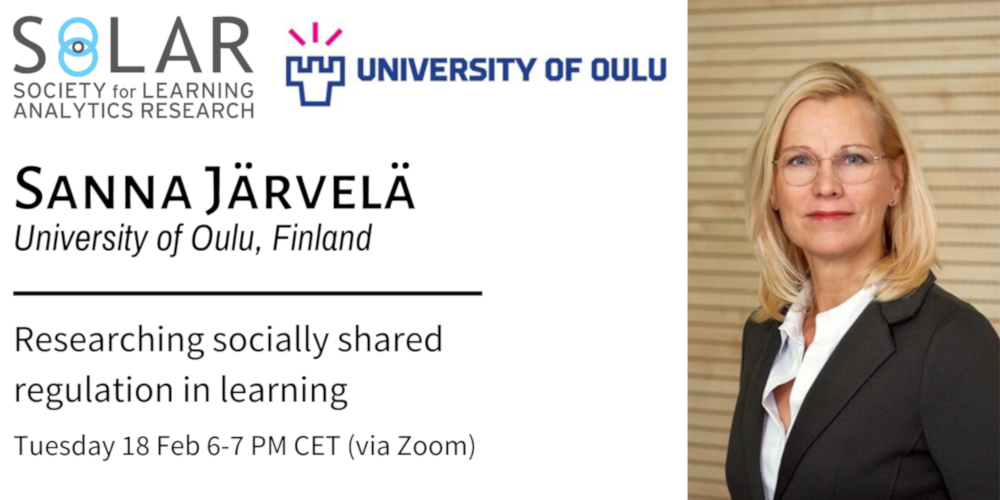SoLAR Webinars
About SoLAR Webinar Series

The Society for Learning Analytics Research is proud to present a new webinar series which will promote high-quality research and practice in Learning Analytics. Webinars are 30-45 min online lectures, followed by lie Q&A with the audience, on some of the key issues and trends in the Learning Analytics field.
To get notified about our upcoming webinars, you can follow our Eventbrite page and you will get email notifications for upcoming webinars. All webinars are run on Zoom platform and the recordings of all webinars are available on our Youtube channel.
Past Webinar Recordings
Webinar 8: What Do We Mean by Rigour in Learning Analytics?

This SoLAR webinar, led by Journal of Learning Analytics (JLA) editors Simon Knight, Xavier Ochoa and Alyssa Wise invites the community to engage with the complex question of what constitutes “rigorous research” in learning analytics (LA). LA is a highly interdisciplinary field drawing on machine-learning techniques and statistical analysis, as well as qualitative approaches, and the papers submitted to and published by JLA are diverse. While this breadth of work and orientations to LA are enormous assets to the field, they also create challenges for defining and applying common standards of rigour across multiple disciplinary norms. Extending the conversation begun in the 2019 editorial of JLA 6(3), this session will examine (a) indicators of quality that are significant in particular research traditions, (b) indicators of quality that are common across them, and (c) indicators of quality that are distinctive to the field of LA as a confluence of research traditions. This session will comprise brief presentations from 6 expert panelists in the field followed by a lively discussion among them with Q & A. This webinar will lay a foundation for future participatory sessions inviting conversation across the community more broadly.
Webinar 7: Does one size fit all? The experience of implementing an academic counselling system in three Latin American universities

When implementing a new learning analytics solution, we often look at successful experiences at other institutions and tend to expect similar outcomes in our own context. However, correctly identifying the unique aspects of a given institutional context can be a determining factor on the success or failure of implementation. In this webinar, we will present three case studies of learning analytics implementation at three different universities in Latin America. In all three cases, the same academic counselling tool developed in Europe was implemented, and we will examine the common and unique aspects of each institution that influenced the success of the learning analytics adoption. We also present the lessons learned to serve as guidelines for other institutions working on their own learning analytics tool implementation and adoption.
Webinar 6: Learning analytics adoption in Higher Education: Reviewing six years of experience at Open University UK

Video recording | PDF slides | QA responses
In this webinar, Prof Bart Rienties will reflect on the process of implementing learning analytics solutions within the UK higher education setting, its implications, and the key lessons learned in the process. The talk will specifically focus on the Open University UK (OU) experience of implementing learning analytics to support its 170k students and 5k staff. Its flagship OU Analyse has been hailed as one of the largest applications of predictive learning analytics at scale for the last five years, making OU one of the leading institutions in learning analytics domain. The talk will reflect on the strong connections between research and practice, educational theory and learning design, scholarship and professional development, and working in multi-disciplinary teams to explain why the OU is at the forefront of implementing learning analytics at scale. At the same time, not all innovations and interventions have worked. During this webinar, Prof Rienties will discuss the lessons learned from implementing learning analytics systems, how learning analytics has been adopted at OU and other UK institutions, and what the implications for higher education might be.
Webinar 5: Analyzing Learning and Teaching through the Lens of Networks with Sasha Poquet and Bodong Chen

Networks is a popular metaphor we use to make sense of the world. Networks provide a powerful way to think about a variety of phenomena from economic and political interdependencies among countries, interactions between humans in local communities, and to protein interactions in drug development. In education, networks give ways to describe human relationships, neural activities in brains, technology-mediated interactions, language development, discourse patterns, etc. The common use of networks to depict these phenomena is unsurprising given the variety of educational theories and approaches that are deeply committed to a networked view of learning. Compatible with this view, network analysis is applied as a method for understanding learning and connections involved in learning.
This webinar will explore the conceptual, methodological, and practical use of networks in learning analytics by presenting examples from real-world learning and teaching scenarios that cover the following areas. First, in learning analytics networks are a powerful tool to visually represent connections of all sorts in ways that are straightforward for humans to act upon. Second, network analysis offers a set of metrics that are useful for characterising and assessing various dimensions of learning. Third, the modelling of networks can help to develop explanatory theories about complex learning processes. We will present case studies in each area to demonstrate the utility of networks in learning analytics. By doing so, we argue for a wider conception of learning as a networked phenomenon and call for future learning analytics work in this area.
Webinar 4: Researching socially shared regulation in learning with Sanna Järvelä

Advanced learning technologies have contributed to progress in learning sciences research. There is growing interest in methodological developments using technological tools and multimodal methods for understanding learning processes (e.g. physiological measures). My research group has been working on collecting multimodal and multichannel data for understanding the complex process of collaborative learning. We have been especially interested in how groups, and individuals in groups, can be supported to engage in, sustain, and productively regulate collaborative processes for better learning. In this presentation, I will introduce the theoretical progress in understanding socially shared regulation (SSRL) in learning and review how we have been collecting, analyzing and triangulating data about the regulation in collaborative learning. I will discuss the current methodological challenges and opportunities learning analytics has helped us trace and model SSRL processes.
Webinar 3: Leveraging Writing Analytics for a More Personalized View of Student Performance

Researchers and educators have developed computer-based tools, such as automated writing evaluation (AWE) systems, to increase opportunities for students to produce natural language responses in a variety of contexts and subsequently to alleviate some of the pressures facing writing instructors due to growing class sizes. Although a wealth of research has been conducted to validate the accuracy of the scores provided by these systems, much less attention has been paid to the pedagogical and rhetorical elements of the systems that use these scores. In this webinar, I will provide an overview of case studies wherein writing analytics principles have been applied to educational data. I will provide an overview of multi-methodological approaches to writing analytics that rely on natural language processing techniques to investigate the properties of students’ essays across multiple linguistic dimensions. This approach focuses on the notion that there are multiple linguistic dimensions of the texts that students produce. Some surface-level features relate to the characteristics of the words and sentences in texts and can alter the style of the essay, as well as influence its readability and perceived sophistication. Further, discourse-level features can be calculated that go beyond the words and sentences. These features reflect higher-level aspects of the writing such as the degree of narrativity in the essay. Webinar attendees will gain a sense of both the conceptual issues and practical concerns involved in developing and using writing analytics tools for the analysis of multi-dimensional natural language data.
Webinar 2: Designing Learning Analytics for Humans with Humans

Learning analytics (LA) is a technology for enabling better decision-making by teachers, students, and other educational stakeholders by providing them with timely and actionable information about learning-in-process on an ongoing basis. To be effective LA tools must thus not only be technically robust but also designed to support use by real people. One powerful strategy for achieving this goal is to involve those who will (hopefully!) use the learning analytics in their design. This can be done by observing existing (pre-analytic) teaching and learning practices, gathering information from intended users, or directly engaging them in participatory design. Such attention to people and context contributes to the development of Human-Centered Learning Analytics (see the recent special section in JLA 6(2)).
In this webinar, I'll present a diverse set of examples of the ways that NYU's Learning Analytics Research Network (NYU-LEARN) is including educators and students in the process of building and implementing learning analytics. We'll look at examples of how to: involve students in the creation and revision of learning analytics solutions for their own use; work with instructors to align analytically available metrics with valued course pedagogy; and partner with an educational team to design and implement interventions based on at-risk students predictions. Webinar attendees will gain a sense of both the conceptual issues and practical concerns involved in designing learning analytics for humans with humans.
Webinar 1: Learning Analytics as Educational Knowledge Infrastructure

The emerging configuration of educational institutions, technologies, scientific practices, ethics policies and companies can be usefully framed as the emergence of a new “knowledge infrastructure” (Paul Edwards). The idea that we may be transitioning into significantly new ways of knowing – about learning and learners, teaching and teachers – is both exciting and daunting, because new knowledge infrastructures redefine roles and redistribute power, raising many important questions. What should we see when open the black box powering analytics? How do we empower all stakeholders to engage in the design process? Since digital infrastructure fades quickly into the background, how can researchers, educators and learners engage with it mindfully? This isn’t just interesting to ponder academically: your school or university will be buying products that are being designed now. Or perhaps educational institutions should take control, building and sharing their own open source tools? How are universities accelerating the transition from analytics innovation to infrastructure? Speaking from the perspective of leading an institutional innovation centre in learning analytics, I hope that our experiences designing code, competencies and culture for learning analytics sheds helpful light on these questions.
